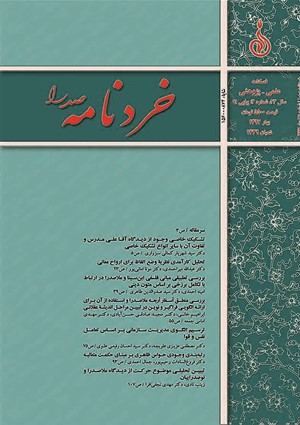رتبهبندي وجودي حواس ظاهري بر مبناي حكمت متعاليه
محورهای موضوعی : ملاصدراپژوهی و اندیشۀ حکمت متعالیهفروغ السادات رحيم پور 1 , جمال احمدی 2
1 - دانشگاه اصفهان
2 - دانشگاه اصفهان
کلید واژه: حواس ظاهري رتبهبندي وجودي سمع بصر ملاصدرا ,
چکیده مقاله :
در سنت فلسفي حكماي اسلامي، بحث در مورد حواس پنجگانة ظاهري، طبق مبنايي خاص و با ترتيب مشخصي انجام ميگيرد. جمهور حكما معتقدند كه ترتيب حواس از اخسّ به اشرف عبارت است از لامسه، ذائقه، شامه و سپس سامعه و باصره، و در ميان حواس پنجگانه سامعه و باصره لطيفتر و شريفترند. بر اساس مباني حكمت متعاليه از جمله حركت جوهري، اين ترتيب جنبة وجودي و كمالي پيدا ميكند و از همينرو بحثهايي كه ملاصدرا در مباحث نفس در مورد حواس ظاهري انجام ميدهد، عموماً وجودشناسانه است. در مورد رتبة وجودي سه حس اول، ترتيب فوق همواره محفوظ است اما در مورد برتري وجودي سمع و بصر، گاه دلايلي ميتوان يافت كه حكم به شرافت سمع ميدهد و گاه بنا بدلايل ديگر، شرافت بصر اثبات ميشود. در اين مقاله دلايلي كه بر اساس مباني حكمت متعاليه براي رتبهبندي وجودي حواس قابل ذكر است، بررسي و تحليل شده و با توجه ويژه بر سمع و بصر، ميان دلايل مرتبط با برتري وجودي اين دو، داوري بعمل آمده است.
In the philosophical tradition of Islamic philosophers, the discussion of the five-fold external senses takes place based on a particular criterion and order. Philosophers generally believe that the order of the senses from the lowest to the highest consists of touch, taste, smell, hearing, and sight, among which hearing and sight are subtler and nobler. Based on the principles of the Transcendent Philosophy, such as the trans-substantial motion, the given order develops an ontological and perfectional aspect, which is the reason why Mulla Sadra’s discussions of the soul in relation to the external senses generally enjoy an ontological nature. The ontological level of the first three senses in the given order is always fixed; nevertheless, regarding the ontological superiority of hearing and sight over each other, some pieces of evidence testify to the superiority of hearing over the other, and some others testify otherwise. In this paper, the writers have examined and analyzed the reasons behind the ontological order of the senses based on the Transcendent Philosophy. Moreover, given the particular attention paid to hearing and sight, they have evaluated the reasons adduced for the ontological superiority of these two senses.
ابن سينا، الشفاء، الطبيعيات، قم، كتابخانه» آيتالله المرعشي، 1404ق.#
ابن سينا، رسالة في القوي النفسانية، در: رسائل فلسفي، قم، بيدار، 1400ق.#
ابن سينا،عيون الحكمة، در: رسائل فلسفي، قم، بيدار، 1400ق.#
ابن سينا،المبدأ و المعاد، تهران، مؤسسة مطالعات اسلامي، 1363.#
ارسطو، دربارة نفس، ترجمة عليمراد داوودي، تهران، حكمت، 1366.#
برك، لورا، روانشناسي رشد، ترجمة يحيي سيدمحمدي، تهران، ارسباران، 2007م.#
راغب اصفهاني، حسين بن محمد، مفردات ألفاظ القرآن، تحقيق صفوان عدنان داوودي، بيروت، دارالقلم، 1412ق.#
سهروردي، مجموعة مصنفات، تصحيح و مقدمة هانري كربن، سيدحسين نصر و نجفقلي حبيبي، تهران، مؤسسة مطالعات و تحقيقات فرهنگي، 1375.#
طباطبايي، سيدمحمدحسين، الميزان في تفسير القرآن، قم، جامعة مدرسين حوزة علمية قم، 1417ق.#
ملاصدرا، اسرار الايات، تصحيح و تحقيق محمدعلي جاودان، تهران، بنياد حكمت اسلامي صدرا، 1389.#
ملاصدرا،الحكمة العرشية، در: مجموعه رسائل فلسفي، ج4، تصحيح اصغر دادبه، تهران، بنياد حكمت اسلامي صدرا، 1391.
ملاصدرا،الحكمة المتعالية في الأسفار الأربعة، ج7، تصحيح، تحقيق و مقدمة مقصود محمدي، تهران، بنياد حكمت اسلامي صدرا، 1380.
ملاصدرا،الحكمة المتعالية في الأسفار الأربعة، ج8، تصحيح، تحقيق و مقدمة علي اكبر رشاد، تهران، بنياد حكمت اسلامي صدرا، 1383.
ملاصدرا، الحكمة المتعالية في الأسفار الأربعة، ج9، تصحيح، تحقيق و مقدمة رضا اكبريان، تهران، بنياد حكمت اسلامي صدرا، 1382.#
ملاصدرا،المبدأ و المعاد، تصحيح، تحقيق و مقدمة محمد ذبيحي و جعفر شاهنظري، تهران، بنياد حكمت اسلامي صدرا، 1381.#
وندر زندن، جيمز، روانشناسي رشد، ترجمة حمزه گنجي، تهران، ساوالان، 2001م.#


